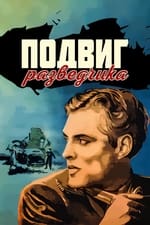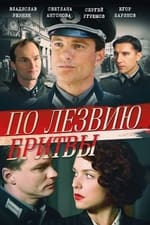Personal Info
Stage Name Николай Кузнецов
Known For Crew
Known Credits 5
Gender Male
Birthday July 27, 1911
Day of Death March 9, 1944 (32 years old)
Place of Birth Zyryanka, Permskaya guberniya, Russian Empire
Also Known As
- Николай Иванович Кузнецов
- Николай Кузнецов
- Никанор Иванович Кузнецов
- Никанор Кузнецов
- Рудольф Вильгельмович Шмидт
- Николай Грачёв
- Пауль Зиберт
- Paul Siebert
Content Score
100
Yes! Looking good!
Login to report an issue
Biography
Nikolai Ivanovich Kuznetsov was born in the village of Zyryanka, Perm province, Russian Empire - a Soviet state security officer, intelligence officer and partisan who personally eliminated 11 generals and high-ranking officials of the occupation administration of Nazi Germany. Hero of the Soviet Union (1944, posthumously). Nikolai Kuznetsov was born into a peasant family, he had older sisters Agafya, Lydia and younger brothers Fyodor and Victor. At first he bore the name Nikanor, and in 1931 he changed it to Nikolai. In 1926, he graduated from a seven-year school and entered the agronomic department of the Tyumen Agricultural College. After studying for a year and becoming a Komsomol member during this time, due to the death of his father from tuberculosis, he was forced to return to his native village. In 1927, he continued his studies at the Talitsky Forestry College, where he began to independently study the German language, eventually mastering it perfectly (later, the Abwehr orientation indicated that he spoke six dialects of the German language). Kuznetsov generally had extraordinary linguistic abilities: over time, he learned the languages Esperanto and Komi, as well as Polish and Ukrainian. In 1929, on charges of “White Guard-kulak origin,” he was expelled from the Komsomol and technical school. In the spring of 1930, he ended up in Kudymkar and was hired by the Komi-Permyak District Land Administration for the position of assistant tax collector for the arrangement of local forests. Here he was reinstated in the Komsomol. Later I returned to technical school, but they were not allowed to defend my diploma - they limited themselves to a paper about the courses taken. While working as a taxi driver, Kuznetsov discovered that his colleagues were taking notes, which he reported to the police. The court sentenced the robbers to 4-8 years in prison, and Kuznetsov to a year of correctional labor with a deduction of 15% of his salary (he was again expelled from the Komsomol). Kuznetsov received a special status in the state security agencies: a highly classified special agent with a salary at the rate of a personnel detective of the central apparatus. Kuznetsov is given a Soviet-style passport in the name of the German Rudolf Wilhelmovich Schmidt. Since 1938, he carried out a special task to introduce himself into the diplomatic environment of Moscow - he actively met foreign diplomats, attended social events, and met friends and mistresses of diplomats. He entered into deals with the diplomats themselves to purchase various valuable goods. Thus, in particular, the adviser to the diplomatic mission of Slovakia (the regime of J. Tiso) in Moscow, Geiza-Ladislav Krno, was recruited. To work with German agents, Kuznetsov was given the profession of test engineer at Moscow Aviation Plant No. 22. With his participation, in the apartment of the German naval attache in Moscow, frigate captain Norbert Wilhelm Baumbach, a safe was opened and secret documents were copied. Kuznetsov also took a direct part in intercepting diplomatic mail when diplomatic couriers stayed in hotels (in particular, at the Metropol), and became surrounded by the German military attache in Moscow Ernst Koestring, which allowed the special services to wiretap the diplomat’s apartment.
Nikolai Ivanovich Kuznetsov was born in the village of Zyryanka, Perm province, Russian Empire - a Soviet state security officer, intelligence officer and partisan who personally eliminated 11 generals and high-ranking officials of the occupation administration of Nazi Germany. Hero of the Soviet Union (1944, posthumously). Nikolai Kuznetsov was born into a peasant family, he had older sisters Agafya, Lydia and younger brothers Fyodor and Victor. At first he bore the name Nikanor, and in 1931 he changed it to Nikolai. In 1926, he graduated from a seven-year school and entered the agronomic department of the Tyumen Agricultural College. After studying for a year and becoming a Komsomol member during this time, due to the death of his father from tuberculosis, he was forced to return to his native village. In 1927, he continued his studies at the Talitsky Forestry College, where he began to independently study the German language, eventually mastering it perfectly (later, the Abwehr orientation indicated that he spoke six dialects of the German language). Kuznetsov generally had extraordinary linguistic abilities: over time, he learned the languages Esperanto and Komi, as well as Polish and Ukrainian. In 1929, on charges of “White Guard-kulak origin,” he was expelled from the Komsomol and technical school. In the spring of 1930, he ended up in Kudymkar and was hired by the Komi-Permyak District Land Administration for the position of assistant tax collector for the arrangement of local forests. Here he was reinstated in the Komsomol. Later I returned to technical school, but they were not allowed to defend my diploma - they limited themselves to a paper about the courses taken. While working as a taxi driver, Kuznetsov discovered that his colleagues were taking notes, which he reported to the police. The court sentenced the robbers to 4-8 years in prison, and Kuznetsov to a year of correctional labor with a deduction of 15% of his salary (he was again expelled from the Komsomol). Kuznetsov received a special status in the state security agencies: a highly classified special agent with a salary at the rate of a personnel detective of the central apparatus. Kuznetsov is given a Soviet-style passport in the name of the German Rudolf Wilhelmovich Schmidt. Since 1938, he carried out a special task to introduce himself into the diplomatic environment of Moscow - he actively met foreign diplomats, attended social events, and met friends and mistresses of diplomats. He entered into deals with the diplomats themselves to purchase various valuable goods. Thus, in particular, the adviser to the diplomatic mission of Slovakia (the regime of J. Tiso) in Moscow, Geiza-Ladislav Krno, was recruited. To work with German agents, Kuznetsov was given the profession of test engineer at Moscow Aviation Plant No. 22. With his participation, in the apartment of the German naval attache in Moscow, frigate captain Norbert Wilhelm Baumbach, a safe was opened and secret documents were copied. Kuznetsov also took a direct part in intercepting diplomatic mail when diplomatic couriers stayed in hotels (in particular, at the Metropol), and became surrounded by the German military attache in Moscow Ernst Koestring, which allowed the special services to wiretap the diplomat’s apartment.
Crew
|
|||
|
|||
|
|||
|
|||
|





